April 1, 2006 S #
Hired Minds to the Printing Press!!!
AIAA (American Institute of Aeronautics and Astronautics) is publishing my book!!!
That's good news... to say the least. You would think the Editor in Chief at a publisher would have the final say in what gets published. Not so. It's the Marketing Department. I finally got the manuscript into the right hands at AIAA back in February. The guy in charge of Career Development Publications liked the manuscript, so he sent it on to their Editor in Chief. He read it over a weekend and likewise wanted to publish it. On the first of March they sent the proposal to their Marketing Department to estimate how much money the book will make. Give them a month, and they say "go" or" no go."
Andy Gibson, a musician / photographer / fashion designer / graphic designer threw together this concept cover for Hired Minds. Very well done. I think of myself as artistically inclined, but this is far better than what I had envisioned, let alone what I could create. It's great having friends more talented than myself. Andy says this is just preliminary, and he'd like to do better. Hopefully AIAA agrees.
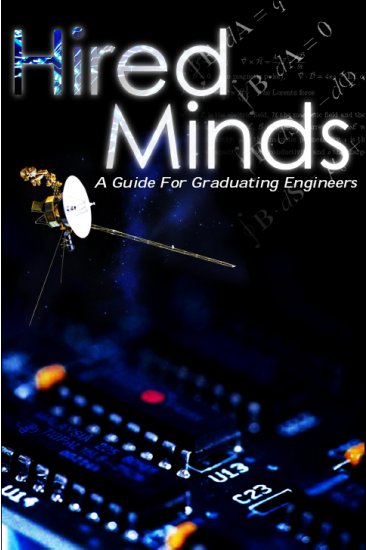
(For the interested engineers... those are Maxwells equations in the corner)
And now the most important part of this book to get into the public domain...
Acknowledgements
First, a shout goes out to my good engineering friends for their superb editorial skills: Katie Timothy, Brittany Reed , and Amber Hardy. It's great to have friends who will compliment you, but it's even better to have friends who will tear into your work with ruthless criticism, taking no concern for your emotional well being. Katie's point blank suggestions really helped to pinpoint what to include and what to cut. Brittany's natural sense of organization significantly improved the flow of several sections. Amber fixed more grammatical rules than I even knew existed. They may not have fixed all my stylistic quirks, but they certainly smoothed some very rough edges.
Loretta Hidalgo triggered me into action at a few critical points, and she followed up for results. Her energy is inspiring, her support is genuine, and she's a shining example of living life to its full potential.
I want to thank the professors at Brigham Young University who have been very encouraging and helpful with this process, especially Dr. Robert Todd, and Dr. Lloyd Hawkins. A little seasoned advice and guidance goes a long way. In addition, Janie Hansen-Nelson and all the secretaries in the Mechanical Engineering department were indispensable to arranging the resume workshops from which this book started.
Thanks to all the engineers and managers at Northrop Grumman, Azusa, who have been great to work with and made my first few years as an engineer an excellent experience. Laura Fishman has been the best manager I could have asked for. She has trusted me with projects that could have been over my head, and given me the support to succeed. The flexibility she allowed has been very helpful in doing all the things outside work that are equally important to enjoying life. I can't overlook the influence of Craig Snow. His objective and candid manner reinforces strong performance and is instructive in missteps. He has made several opportunities available, without which this book would have never been started. Paul Russell proactively took the time to review the manuscript when I thought it was ready for publication. His perspective as an executive made a significant difference in the final product, and triggered the final round of reviews that really completed the book.
Greg Larson was an indispensable connection to the people at AIAA. From workshops with Los Angeles area universities to providing contacts, he was always willing to help out in any way possible.
My brothers and parents have been far more influential than they may think. This book is about living life to the fullest, and they're my strongest examples of doing just that. Whether laughing about a screwball medical patient, ripping around in an airplane, teaching in Mexico, or pulling turns out waterskiing, it's encouraging to see hard work and fun go together. My Mom's improvisational throw-it-together-and-make-it-work style is the example I followed in starting and finishing this book, while my Dad's structured and methodical work habits carried over to keep everything organized and throughout the process. I couldn't ask for a better family.
And finally, thanks to all my friends and the engineers whose experiences make up the content of this book. There are several whose experiences were influential in developing the principles in this book, but aren't included for the sake of brevity. Your names and experiences may not be in here directly, but they helped to shape the content and flow. Thanks for the conversations, and most of all, thanks for making it fun.
|
April 11, 2006 T #

Less than two months from now, this will be the conclusion of my morning commute... by foot!!!
|
I spent Thursday through the weekend in Boston for the LFM Open House. Had a blast!!! First thing showing up, several of us who met during interviews were stoked to see each other again. And for everyone else we hadn't met... we may as well have already been friends. It's like the admissions committee said "Lets pick 50 people who will be best friends." The diversity of backgrounds and interests, balance of character types, and overall personality composition of the group is unbelievable. The last time I felt so naturally connected with a group was with my engineering friends at BYU. At BYU we naturally found each other and became good friends. Showing up at MIT, it's like the LFM team already did the finding for us, and just threw us together.
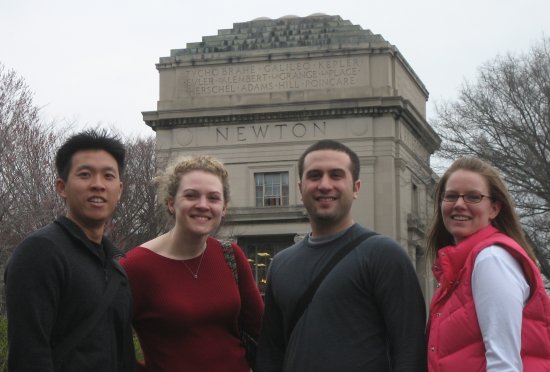
Everyone in the group is totally down to earth. Not once during the whole weekend did I hear anybody say a single thing about their accomplishments, credentials, whatever, in an effort to build themselves up or impress anybody. Talking with everyone, they've all been exposed to so many different aspects of life and people, and they're entirely comfortable with themselves and others. Hanging out with them, I never got the feeling of being surrounded with a powerhouse group of intellectuals. At HBS, it felt like everybody was very smart and ambitious. At MIT, it feels like being surrounded with people on your own level. It doesn't take long to see that the brilliance and energy is there, but there is no feeling of differentiation between themselves and anybody else.
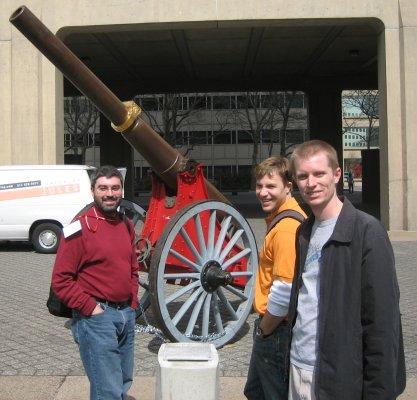
Any Cal Tech alum's? That cannon was on your campus just two weeks ago, less than five miles from my house. Theft is a wonderful thing... especially when it travels from coast to coast.
I would say I'm looking forward to these next two years... but mentally, I'm already there. I've found my friends, and know where I belong. There were a few who are likewise admitted to the Triple M program at Northwestern (Kellogg). Most seem to be favoring LFM, but everyone has their own objectives and considerations. I want them at LFM, so my initial inclination was to convince them LFM is the way to go (for me it's a no-brainer), but it doesn't take long to recognize that everyone has to decide what is best for them.
|

All that stuff aside, I've always wanted two years in Boston... and I'm more stoked about it than I thought I would be. Renting in Boston is a little unusual. Everybody has to go through a rental agent. I initially thought that was stupid, but if they didn't do that, every building and street would be littered with For Rent signs. The ambiance of Boston is great, and a littering of bright loud rental signs would really detract from it. And shopping with a realtor isn't so bad. Everything is within walking distance, so stopping into an office is like walking into a bike shop to check out what they have. Then instead of a test ride, you take a walk
 _ _
In case you can't tell from the pictures, I found the coolest loft in all of Beacon Hill. I was resigned to signing on a place that would be small and nice enough, and then I walked into these vaulted ceilings and beams in a totally non-typical setup... and the search was done.

Check out the slope on that floor. When it snows, I'll open those doors overnight and go sledding in the morning. I think that slope (which will provide so much entertainment) is the reason I snagged this place for less than a typical one bedroom place. It's still ridiculously expensive, but so goes capitalism. This place in itself is worth moving to Boston.
|
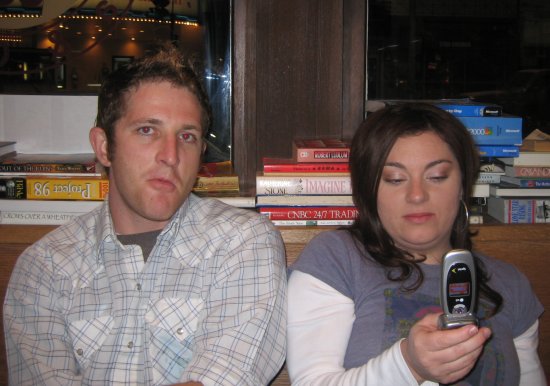
Running around LA is still fun.

I finished processing some really interesting thoughts, and I was going to write through them, but this is enough blogging for one day.
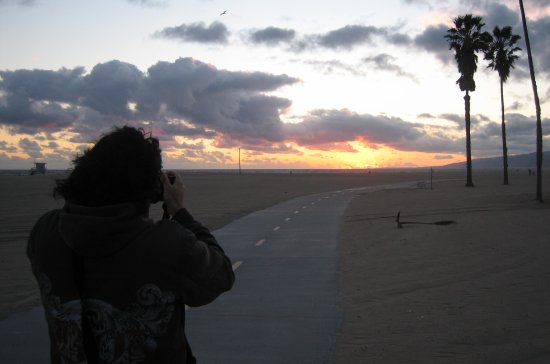
This is Andy, who did that cover for Hired Minds.

Santa Monica. All this rain over the last month has been great. I love going to sleep to the rain, waking up to the rain, sitting and thinking in the rain... all that stuff. And it makes great sunsets. No filters or color modifications on this shot. It really looks that vivid.

It doesn't require conscious will to create beauty, but it is conscious will that enjoys beauty.
|
April 13, 2006 R #
Iran Becomes a Nuclear Player
Generally, I'm a proponent of technological advancement anywhere in the world, but technology brings power, and power can be a sticky issue.
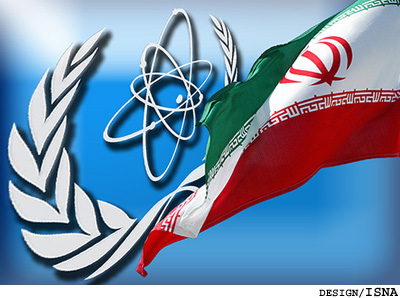
Iran is celebrating their ability for sustained development of enriched uranium (Nuclear Energy). By reasonable estimates, they're 3 to 10 years away from the capacity for sustained development of nuclear weapons. I like to focus on things like manned space, which is nothing but fun, but I have learned that there are malicious people in the world, and they can't be trusted with increased power. This is an exciting time for Iran, to be entering the Nuclear Age, but for those against whom Iran holds enmity, it is a time for serious concern. As the present super power in the world, it is easier to trust ourselves to hold that power. In the overall picture, I believe the US has proven it's trustworthiness to hold this position as the worlds reigning super power. However, not all countries, and certainly not all leaders, can be trusted with this power. I think Jacque Chiraque of France has demonstrated his character as a political sparring opportunist, but even so, I think he could be trusted to not misuse the reigns of the world's super power. Mahmoud Ahmadinejad, President of Iran? I'm not at all comfortable with him at the reigns... especially with the religious power he holds. The US is generally Christian, and was built on Christian principles, but this country is not religiously united. Bush has his Conservative Christian base as his support, but American Christianity is fragmented such that no single leader could unite them in a crusade. Islam on the other hand, is a united religion. Islam has not become fragmented like Christianity. This unity gives a leader of sufficient Islamic influence the capacity to call upon that united strength to lead a crusade, or rather, jihad. "Never underestimate the power of stupid people in large numbers." We laugh at that phrase, but stupid people, united in religion, and guided by an intelligent cadre of leaders... the masses of people become a formidable power to be wielded. They don't have to be "stupid people". Actually, they have to be smart and skillful to be of any real effectiveness, but to be harnessed as "stupid people" they just need to be sufficiently ignorant, sufficiently believing, or sufficiently driven. I would prefer to celebrate with Iran in this newly developed capacity for bringing power to their country. I would love to hang out with their scientists and engineers, and hear their stories of developing this technology. At the same time... can we trust their military and political leaders? Can we trust their culture? I don't know enough to make that judgment.
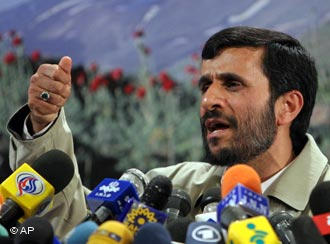
At the same time though, the UN is a worthless, toothless, powerless organization for interacting with Iran on this issue. The LA Times reports several diplomats at the UN saying they think Iran might be willing to stop at this point, and not develop their capacity any further. What?!? Hello?!? Iran's President just announced and celebrated their plans to continue expanding their nuclear capacity. Iran hasn't slowed down the least bit during the last few years while the UN has been telling them to stop and scale back. How can the UN possibly believe Iran is going to stop now? Idiots!!! Fumbling, drooling, babbling IDIOTS!!! It may not be right to call for a military strike to stop Iran's progress, but how can any self respecting person think Iran is going to stop developing their nuclear capacity? The political players of the world (including the voting public) need to pull their head out of the sand, face up to what Iran is doing, and judge if they can be trusted to continue. It's a complicated issue with far reaching consequences for either interference or inaction... but decisions need to be made, and the worlds political players need to take responsibility for those decisions. They wanted the responsibility for those decisions, and they need to step up to it. Unfortunately, I'm convinced many of the political players wanted the fame and power, seeking a second hand affirmation of their lives, not really recognizing the responsibility associated with their position... but so goes it. They have the position, and they should step up to the responsibility instead of cowering behind vain hope for diplomacy.
It's short sighted to think we're going to indefinitely hold the countries of the world back from developing nuclear power, and along with that, nuclear weapons. This technological progress is inevitable due to the human nature for progress. The important thing for the existing powers of the world to do is to maintain stability throughout this development process. We need to allow countries to develop with this power in such a way that it becomes in their best interest (and the best interest of their culture) to allow the other of the countries of this world their liberty. India is doing well with this sort of progression. Put provincially, we need to allow the development of nuclear power as friends, and prevent the development of this power as adversaries. The trick is how to best facilitate this friendship, because I don't think it will happen through diplomats and politicians. It has to happen on a cultural level. Currently, I think that Google and UPS are among the strongest forces facilitating this worldwide friendship development on a cultural level. (Google representing the power to share information, and UPS representing the power to share materials goods).
"Can't we all just get a long-board?"

Sure. Order your longboard on the net in Australia, from a company based in America, the order processed through India, shipped from China, on a ship built in Norway, crewed by Philippinoes, running on fuel pumped in the Middle East. The more we get countries into the economic loop, the more "we can all get a long-board."
|
April 14, 2006 F #
Responses on Iran...
Katie fired a prompt response to yesterday's Iran post. Her points are worthwhile, so I thought I'd post her points with my comments.
So you propose that we tell them to stop unless they are our friends?
- We've already told them to stop. The whole world has been telling them to stop for years. That's the role the UN plays.
- Being "our friends" and being "friendly" are different. England is among "our friends." France thinks they're too sophisticated to be "friends" with the US, but they're "friendly" to the US.
And if they don’t?
- They didn't stop... nor do they express any intentions to stop.
- Imagine:"Oh, you're right. We're planning to leverage our nuclear power to create another Cold War, and that's not very nice, so we're going to stop." The ridiculous thing is that's exactly what these UN diplomats seem to think will happen. Stupid.
- Or from the sympathetic perspective: "We're not planning to hold any countries hostage. We just want the power to defend ourselves against the forces in the world that will squash us if we stop selling oil to them." This seems, in my judgment, to be a perfectly justifiable reason for developing their military capacity. The only reason others need to fear is if a leader comes to power who decides to leverage that power offensively... and if the people under that leader support him in his aggressive use of force.
Send troops?
- Replacing a government (Iraq) is different from destroying technological capacity. A few smart bombs will kill their technological capacity. The only troops necessary will be a few pilots and maybe a few special op's teams. We can repeat that every few years, as long as we can keep track of where they're developing weapons (easier said than done). Even so, such action has further reaching repercussions. Recall, it's the cultural friendship that needs to develop, not just agreements between diplomats and politicians.
Cold War II?
- This is what we want to avoid. Cold War II is the primary reason to intervene. Cold War can be prevented, but dismantling it... that requires something on the magnitude of a collapsing economy. Also, it wasn't so difficult to push Iraq out of Kuwait in the early 90's. If Iran takes that mindset with a neighboring country, it would be a far stickier situation. "We don't want the world, we just want this country... and we already took it. If you try to take it back, we'll send a nuclear warhead over Washington."
If you want to throw weight around as a super power you have to be ready to back it up with force. The UN just doesn’t have the force.
- And it's a good thing they don't have that force. Whenever they call for force, it's the US that supplies the force (with small supplements from other countries. The US allows the world to live on a sort of "military welfare."). Countries like Iran (and Iraq) don't give the UN a second thought because they know the UN won't stand behind what they say. At this moment in history, Iran is safe from any military action because the UN is utterly powerless, and the US is so divided about Iraq that there's no way Bush could gather the support necessary for even a simple precision military strike. With the US divided, Iran is totally safe from military intervention. Iran (and North Korea) couldn't ask for a better opportunity to safely develop their Nuclear capacity. Creating these geopolitical conditions which allow Iran and North Korea this kind of impunity was the real danger of going into Iraq... but our hand was forced. Iraq was doing then exactly what these countries are doing now... except Iraq included the malicious dialog, expressing intent to destroy the US as soon as they got the chance. Iran is more politically correct about their intentions. The weakness is in the American public's poor recognition of the strategic and tactical positioning of the aspiring world powers. They don't see what is happening, only what has already happened. It's the unity of the American public that allows us to move as a world power. No unity, no action.
Nice long-board analogy. I’ve never heard it put so well.
- Thanks. I have to credit the play on words to a t-shirt I saw at Huntington Beach.
When do you leave for Boston? If I needed a place to crash in May do you think your couch would work?
- Anytime (before mid May). Just say hi when I come home and find you there... or you can let me know in advance, but that's not as much fun.
Billy Joel is one of my favorite artists. His earlier music in particular has good depth and insight. This track is written of friendship across the Cold War, but it could just as easily be written of a Muslim and American friendship.
Leningrad
This song is valuable reflection on what we've learned of humanity through the Cold War, but we must still remain aware of the differences between life in the US and life in Iran. We have the opportunity and cultural encouragement to look back at what has happened through history, what is happening across the world, and to reflect on both an individual and collective basis. Many of the members of these other countries haven't had that opportunity. Their judgments must be made on a more narrow scope of understanding; not because they're narrow minded, but because they're narrowly exposed. That's why I believe Google is so important; because it broadens their exposure. Even so, it takes time to learn from increased exposure. Batman Begins says it well: "It's not who you are inside, but what you do that defines you." We've seen in history where a whole nation of good hearted but narrowly exposed people can support terrible actions. The enemies of Western Civilization can be good people at heart, but because of narrow exposure they can be led to do terrible things. We must prevent them from destroying the good we have created, long enough for them to develop sufficiently that their actions are as good as their hearts. If we let our good actions be destroyed by their mis-inflamed hate, the good is lost and nothing is gained. We must cultivate goodness, and in the mean time ensure that good prevails over hate.
One more realization that just came together in reference to this issue, but was seeded in conversation with a girl who has lived in Poland the last few years . You'll have to pardon the generalities that are going to be used here.
Weak Leaders vs. Weak Followers:
It's not a matter of America having a weak leader; it's a matter of America having weak followers. As a country, collectively, we have no stamina. We enter a war to replace a government and expect to be done as fast as a video game. The invasion was that fast, but establishing a new government takes more time... especially when it involves such a drastic cultural adjustment. We have no perspective on pain tolerance (casualties) either. Since the invasion of Iraq, we have lost more Americans each year to underage drunk driving than in the war. That's only underage, not including legal age drunk driving deaths. Alcohol is killing Americans faster than Insurgents and Terrorists combined, but we don't see many protestors of under-age drinking. Do we really care about American lives, or is it just arguing for which political team is right or wrong? Our leaders could do their job much more effectively if they had better followers. We need a more strategically minded American Public. (much more analysis is worthwhile on this concept).
Vote vs. Protest:
Here in America, we don't care about our right to vote, but we cherish our right to protest. "You can do whatever you want, as long as I can complain about it on national television." Interpolated to personal motivation, American's don't care about their ability to live their own lives, but cherish their ability to influence somebody else's life... we would rather live by proxy (through somebody else?) than live individually. In Iraq, the voter turnout was over 30% higher than here in America... and the Iraqi's even faced the highly publicized possibility that they might get blasted by insurgents. They seize their right to vote, and get on with their lives. We could take a lesson from them in appreciating democracy, not just freedom of speech. The American reflex is to go against whatever action has been decided. It doesn't matter what course is right; whatever course is being taken, the American assumption is that it's the wrong course. I think a lot of this is motivated by the feeling that "you're making a difference" if you're protesting, whereas marching with the ranks feels like you're insignificant. Those marching in the ranks never get on television, so it's easy to assume they're not motivated, independent thinkers, or important. The reflex to seek fame motivates protest. It would serve us well to speak and act by intelligence instead of reflex.
That should be sufficient political commentary for the year.
|
April 16, 2006 O #
Iranian Bloggers ( this isn't nuclear or political )
I wrote some things that express my then present perceptions of Iran and Islam... and I'm not sure they're correct.
To this point, most of my blog reading has been of individuals within the US. On Friday it occurred to me that we have bloggers all over the world, and I'm just a click away from the personal lives of people in Iran, China, and everywhere else. So I did a search for some Iranian blogs. I tried to avoid political stuff, looking for social bloggers.
The Adventures of Mr. Behi seems to be a pretty good blog. Rounded with lots of topics, he expresses his opinions but is aware of the perspectives of others, and he just seems more interested in living life than making a statement. He also links to many others, so you can web out for a good sampling. And he has pretty good pictures in his photoblog... a few of which I will borrow for this post.
Reading these Iranian blogs has been eye opening. First, as I expected, people are people, no matter what country they're in. They laugh about their lives, care about people close to them, are concerned about their jobs in the future, and don't like politicians jockeying for international power. I am surprised at the extent to which everyone listens to American music and watches American movies. They're very aware of American media / news as well. They read the same news we read. They're very aware of the general Christian basis in the rest of the world, and much more religiously understanding than portrayed. And the New Year celebrations in Iran are all centered around Spring, and just wrapped up.
Even with the similarities, there are differences between their lives in Iran and our lives in America. Their technological infrastructure is a few years behind ours, and their government has an influential hand in any web traffic and commerce. It's sort of an unexpected hybrid of America and the Iran represented in the news.

An unexpected insight is the generally expressed perception of the US. The impression I got from several blogs is that the Iranian people are fairly objective and understanding of the people of the US and our government. Listening to the media in the US, all we hear is that everyone in the world hates the US, hates our presence, and hates our policy. Not so. The Iranian bloggers I read are not nearly as critical of US foreign policy as several people I work with, and certainly not as critical as the American protestors. Many Iranian bloggers expressed distaste with the media showing such a biased representation of their people. The bloggers are also sympathetic in that the media can't get access to fair minded people because the Iranians are too afraid of their government to allow their face to be on television saying anything other than affirmative praise for the government. I found very little criticism of the Iranian government, just acknowledgement that they can't influence their governments action. However, genuine concern was prevalent concerning Iran's persistence in developing nuclear power. They're generally understanding of the position of the US, EU, and other governments, because of the Iranian government's nuclear persistence. They're not angry at America, but they are afraid of the inevitable future their government's policy is leading them into.They don't care who is right or wrong; they care about the lives they'll get to live.They want to live their lives, believe that Americans want to live their lives, but are powerless to stop what the governments are doing. (just to clarify... they don't express agreement with US foreign policy, but they're not as fanatically opposed as many Americans. And... this is my summation of a general sampling; fanatic and sympathetic samples can both be found.)
Many Iranians are perturbed with their governments pursuit of nuclear technology. They're fully supportive of technology development, but would prefer that the resources were applied to technology that will compete in the developing world market.
"Leaders are pursuing nuclear technology in the mistaken belief that they can threaten their way off of the 'invade' list, like Korea did."
Unfortunately, they don't have practical control over their governments technological development efforts, so they can't influence them in a direction that will improve their national standard of living, and national standing in the business arena.

My latest reading in The World is Flat (still highly recommended) quickly went through three factors that give America the greatest advantage in this flattening world. 1) Openness: Say anything, do anything, try anything, fail at trying and get up to try again, etc. 2) Labor Liquidity. Relative to many other countries, Americans have a super easy time with hiring and firing people. Some companies get laden with Unions which reduce this capacity for fast response, but the government is relatively hands-off in the overall process. 3) Intellectual Property. America protects intellectual property like nowhere else in the world, which makes it a very attractive place for innovators and innovative institutions (companies, universities, etc). Iran is missing at least the first two of these factors (don't know about their IP laws). Even something as simple as surfing the web is hindered. This clip is from a January '06 post from Mr. Behi's blog:
Free but slow internet
I am still using the very slow satellite connection for Internet and considering the amount of business/personal activities that I have on-line, it is very miserable. The only good thing about not using the Iranian network of fiber optics for a while is that there is no filtering machine :-) so you can surf the web without being stopped by the "Access denied" warnings. There is indeed a positive side in any misery, the point is finding it soon enough.
Another blogger notes (his blog won't let me link directly to post) that American companies help these governments create the filtering systems. It's interesting getting the user perspective after having a read an article a couple months ago on the flack Google is taking from working with China in making Google searches friendlier for Chinese Government approved content. Google claims intentions that serve for strategically increasing Chinese access to knowledge and information. I think Google is taking the best course of action, but that doesn't diminish the present limitations people like Mr. Behi are still are faced with.
It can be frustrating on both sides. These Western companies bring the internet and computer technology to these developing countries, and then praise for bringing the technology is quickly replaced with criticism for abiding by the local government's regulations. It seems to be immediately forgotten that were it not for Google, Yahoo!, and Microsoft, among other Western technology developers, there wouldn't be internet and search capacity in the first place. The Western companies didn't have to offer the technology in the first place, but they chose to offer the technology, often at a steep discount. I'm convinced that gratitude cannot be determined by external actions; it is purely functional of the individual's personal choice for recognition of what is offered, and capacity for recognition. We should always be striving for a greater life, but we should simultaneously be grateful for the enabling power that others have shared with us.
Mr. Bahi and others have included posts about the Nuclear issue for quite some time, and it's interesting seeing his perspective vs. my perspective on non-military means of enforcing international law, namely, economic sanctions. Even if a government is breaking international law, the people in the country still have an economy they're working in to live their lives. Sanctions will be placed on his economy. He knows what it is to wait in a long line to buy milk to feed his little brother. The tension his government is creating with their nuclear ambitions is something all Iranians experience directly. A girl writing under My Lucid Dreams brings to light the personal impact these political decisions have on her life, in a time reference I can freshly relate with.
"I am so afraid of future.I have finished school.I am looking for a job.Whatever USA is going to do will have high impact on my future as ordinary citizen of this hell hole.If the security council imposes sanctions.Life will get much harder here."
I used to think that economic sanctions were a better alternative to pinpoint military strikes, but now I'm wondering if a precision strike would be better for the people of the country. It would allow them to continue with their lives, sell whatever they can produce and buy what they can afford. Economic sanctions don't affect the leaders, but it has a broad impact on the individuals of the country in both the short and long term. I think the key to these situations is to somehow empower the individuals of the country in such a way that their leaders can't hold them hostage to further their political ambitions. It seems that international commerce is the best way to do this. Commerce may be the best way to get leverage into the hands of the individuals in the country, as well as the interest of the population of the interacting nations. Economic sanctions seem like the "bloodless" alternative to military action, but they only work if the leaders actually care about their people. If the leaders actually care about their people, they'll be applying resources to empowering their people, like India has, not political power playing. For leaders that don't care about their people, sanctions have no effect on the leader, and hurt the people. But military strikes, even if precision and relatively bloodless, are still tricky. Complex issue...

... but time is marching, people are moving, and we have to execute decisions based on the understanding and power we have at our disposal right now (I absolutely love this picture for illustrating that reality). Given this reality, we need an effective strategy to operate by which we can create the life we want to experience. I believe that empowering individuals to pursue their constructive desires is the most effective strategy to achieve this, whatever country they may be in, whatever their economic or political influence. If "constructive individual empowerment" is carried on a large enough scale... well, I think that is what has made our current Western Civilization so prosperous. Let the catalyst for prosperity spread.
So that's my Sunday (virtual) trip through Iran. in about the time it takes to fly to Boston.
It's been eye opening. I'm a re-confirmed fan of blogging.
On a more playful note... 0 to 82 mph in 2 seconds feels pretty darn cool (5 G's). I've been proven wrong regarding rollercoasters. I've claimed rollercoasters are overrated for the past severl years, but 4 of the 5 rollercoasters at Knott's Berry Farm yesterday easily exceeded my expectations. Definitely worth the ride.
|
April 24, 2006 M #
Have you ever had a perfect 72 hours in a row?
I just did. It started with a productive day at work on Friday, spontaneously transitioned into Volleyball on the beach at Santa Monica, conveniently happened to mix in with Stephanie (a new MIT friend in Santa Monica), and then ended getting Dave Bowen started into creating a web site where he can post pictures and stories from his last six or so years surfing all over the world and promote some of his film work.
Saturday morning Cal Tech had a presentation on Semi-Autonomous systems, and I was left dumbfounded in awe of the power we are gaining over the materials in this universe... including our own bodies. Dr. Satava of the University of Washington presented some of the recent developments in their biomedical technology. Much of it is available on his web site... but the pictures and videos without the dialog don't do it justice. Everything he presented is what we're capable of with PRESENT technology.
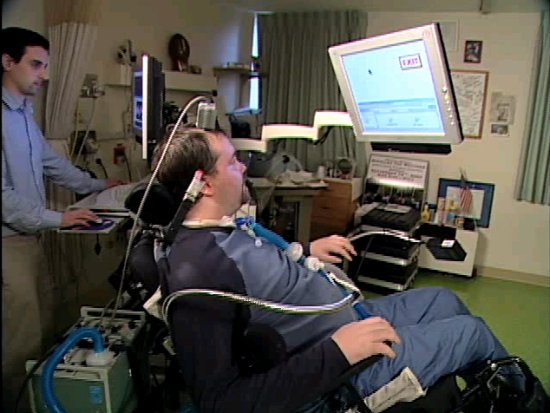
The Matrix isn't so far away. Less than a year ago, this paraplegic shown here had an implant wired into his brain. After only three months, by the power of thought he could draw a (sloppy) circle on a computer screen, and move a mouse to click buttons and navigate between screens.
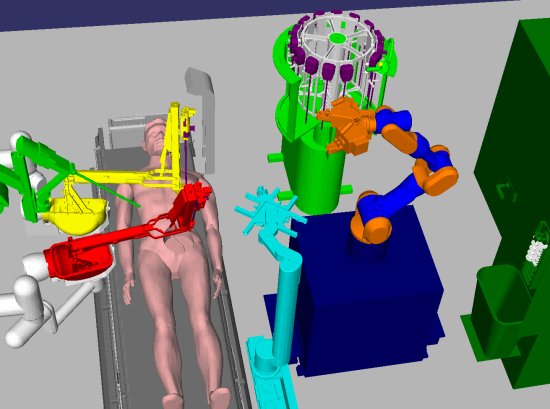
The convergence of information technology, biotechnology, and mechanical technology is just as impressive, but takes more words than I'll use here to describe. Just know this. By 2025, a doctor in the US (and not much later, a doctor in India, China, etc) will be able to operate on a person anywhere in the world, guiding the instruments with their own hands. Remember, this is using technology we already have developed. And as for autonomous surveillance and analysis... it's a fun world we're creating.

Risela, the sweet girl in pink between the two pirates, had tickets to the Renaissance festival. We've been friendly acquaintances since the X Prize, but this time we really got to talk and found out we should have become better friends long ago. Saturday ended at 2 am after an impromptu decision to go salsa dancing. Always a good way to spend the evening.

Sunday lunch with four of us from LA heading out for LFM was a good reminder of why I'm looking forward to the next two years... and was some much needed motivation to get into the logistical things of registration and preparation for school. After lunch I finally made good progress in that area, and now I don't feel like an irresponsible slacker anymore.

Discovering a new good friend always calls for another evening together, so Risela and I got a Peppermint Chai Latte and found our way to a bridge near Pasadena that I've been determined to walk across before I leave LA. It took almost three years, but now I can check that one off.
|
April 25, 2006 T #
The "Hottie" Equation
I am the proud source of technical insight leading to this commentary on the forces shaping the future aesthetics of our country, but it took Diego to illustrate it in layman's terms like only a non-engineer musician can.
And I found this informative biotech article on the paraplegic noted in the previuos post. It's not very technical, but offers a functional illustration of the accomplishments in this field as of about a year ago.
|
April 27, 2006 T #
The "Flashing Bubble"
I met up with a friend working on his PhD at UCLA and part time with Raytheon. We originally met at NG a couple years ago, and share a common technological mindset with a practical bend. Phillip is reaching to research the phenomena causing an extremely high energy flash (~10,000 Kelvin) releasing energy through an acoustically activated bubble in water. The real kicker in this is that nobody understands the physics that allows this bubble to flash with the energy that it demonstrates. Phillip thinks that it's a phenomena of special relativity... but nobody knows yet. His hope is that understanding this phenomena will give him the understanding to develop a revolutionary propulsion system (Yes, he's another space buff), and a tap into a new means for energy transfer. Lots of other cool stuff going on.
It occurred to me that at this stage in our lives, everybody is looking at some sort of opportunity that will only be available now. Ten years from now, if Phillip's research doesn't pan out, he can revert to some other research or engineering related application. He has other research options he could pursue, where it would be easier to find funding and technical peers, but he believes there really is something in this "flashing bubble" (my layman's term for the phenomena). Ten years from now, he won't be positioned to go back and pursue this understanding. Right now, he has the talent and opportunity. I would love to pursue something that technical in nature, but that's not my talent. I am presently positioned with the greatest opportunity and talent in the corporate track, so that is the track I am running. In ten years, I can always revert.
The trick to anybody deciding what they will do with their life is to find that convergence between your horizon of opportunity and intrinsic talent. You can't force opportunity, and you can't force talent, but you can find the optimal convergence. Then as everybody runs with their greatest opportunity and intrinsic talent ratio, the world somehow balances itself out with everybody. Technology gets developed, business are organized, and we all have a good time. It's a great way to be alive.
|
contact
This is a personal web page. Things
expressed here do not represent the position of my employer.
|